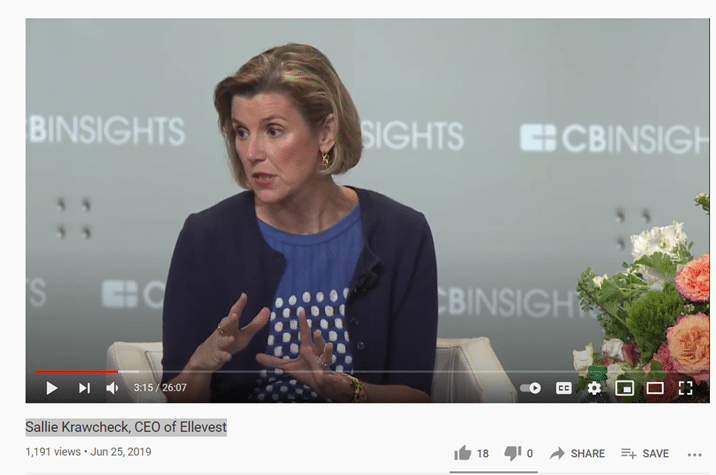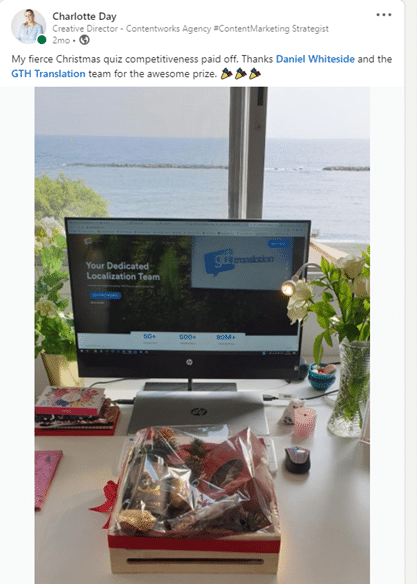As a social media manager or agency owner, you sometimes have to do pitches and presentations for clients and other departments.
But how comfortable are you with public speaking? Is it something that you struggle with?
Public speaking is something that sends ripples of anxiety through a large chunk of the population, even professional speakers.
I’ve witnessed established speakers shaking before a performance and downing pints of water to soothe their dry throat. But mastering public speaking has so many advantages.
As a recognized public speaker, you will gain business, followers, and credibility in your field. You will also gain access to high-profile events, other high-caliber speakers, and an esteemed place on the public-speaking circuit.
I often do keynote and panel speaking on behalf of Contentworks Agency. So, in this article, I’m going to share my actionable tips on how to master public speaking.
Take a big deep breath. Let’s do this.
hbspt.forms.create({
region: “na1”,
portalId: “8477337”,
formId: “5fd07ba8-5aa7-4bb7-9130-a990a8f0701d”
});
1. Plan Your Speech
Planning and preparation are two key factors that make great public speakers.
If you feel prepared and know your speech well, you will feel free to add humor, audience interaction, and respond to impromptu events.
Here are some tips for planning and preparing your speech.
Honor the time limit
First thing’s first, don’t go over the allotted time. Doing so stresses out event organizers who are left with the uncomfortable task of wrangling you off the stage.
When you’ve written your presentation, set a timer and read it. If in doubt, shave off some speaking points before you rehearse it.
Leave time for questions and audience participation.
Know your subject
I’m a huge fan of Sallie Krawcheck, CEO of Ellevest, who absolutely nails public speaking around the subject of finance and women in finance. Check out her astute, fact-filled public speaking style.
It’s good to push your knowledge boundaries but, generally speaking, stick to topics where you’re the expert.
Agorapulse tip: Use Agorapulse’s monitoring tool to stay on top of online conversations that can help inform and round out your presentation. Breaking news about your company, space, or competitors may come in handy in shaping your presentation.
Read your speech aloud when you practice
Have a friend or colleague record you.
Watching your body language and hearing your tone will help you refine your presentation. It also allows you to play your recording back on headphones before the event and memorize it even better.
If you’re doing a joint presentation, you need to practice with your co-presenter. Learn each other’s cues, when to speak and, also how to help one another if you lose your way.
Don’t clutter the slides with text
Instead, include high-resolution photos and videos.
One of the best presentations I saw was with Mastercard’s Vice President of Digital Services James Carroll. His slides were beautiful photographs that backed up his points or the stories he was telling. It was mesmerizing and meant I could sit back and enjoy his speech without trying to read or copy notes.
Another skill to learn from James is eye contact. Check out this press conference and his engaging eye contact and body language.
Don’t rush things
If you include a video, leave time for it to play and for the audience to be absorbed in it.
Don’t feel the need to talk over it. In fact, leave a long pause at the end for the audience to absorb the message before you move on.
Practice your body language and movement
Are you going to stand still or move around? If you plan to move around, be sure that this doesn’t interfere with your microphone or volume as this can be annoying.
Add humor to keep your audience interested
I love this Ted Talk from Shawn Achor, CEO of Good Think Inc. His presentation is fact-filled and insightful, but his witty anecdotes and stories have the audience laughing and wanting more. Check it out.
Plan what you will wear
This goes for online and in-person events. There is no set rule on this but a few things to keep in mind.
- You are on a stage and people are looking up at you. Short skirts or dresses can be problematic or require you to sit in a certain way.
- You should feel comfortable in whatever you’re wearing. That means clothes loose enough that you can move your arms, walk around, sit down,m and breathe!
- Your clothes should represent who you are. There is no need to wear a suit if that really isn’t you. Similarly, don’t do the jeans and sneakers thing if you’re a suit guy!
2. Prepare to Go to Plan B in Public Speaking
I’m all about positive thinking but I’m also a realist and things can and do go wrong at events whether they’re live or online.
I once spilled a coffee down my shirt 5 minutes before I went on stage at a live event in Athens. Hello, the blazer that I bought with me!
Here are some of the things you should prepare for:
Have a spare stage outfit
As my story shows, you really do need to be prepared. Plan two great choices for your public speaking session and bring the spare with you.
Usually, the event is in a hotel, and there will be somewhere you can store it if you don’t have a room.
Rehearse without the slides
All too often tech problems mean the autocue or projector stops working leaving you alone on the stage with your thoughts.
Once you know your speech, practice it without the slides and learn to see the humor in these situations.
Agorapulse tip: If you’re not comfortable speaking, practice in front of the camera. If you’re not comfortable in front of the camera, check out these tips to help you level up your speaking game.
Practice with distractions
This is something those of you with children (or noisy pets) will be accustomed to.
However, understand that your audience may be chattering, coughing, or there might be a lot of background noise outside. Work with it.
Don’t expect complete silence during your keynote. That said, if everyone is talking, your speech might be boring. #justsaying.
Have a backup plan if your online tech fails
Understand from event organizers what you should do if your Internet connection is lost or there is a tech problem with the panel. Sometimes, it’s simply a case of refreshing your browser or logging out and back in again.
But knowing what to do will eliminate your panic.
Know the environment before you speak
This can help you see potential pitfalls or issues. Get to the event ahead of time, stand on the stage, and walk around it. Watch for the glare of the lights, steps you don’t want to trip on, and the location of the projector screen.
Did you know ... Glossophobia is the fear of public speaking and of all the phobias, public speaking is the highest. It affects 75% of people who fear any kind of speech. Preparation and planning can help a lot in addition to some deep breathing and focused meditation.
3. Keep Your Audience Engaged When Public Speaking
Audience attention spans are short and if the event you’re speaking at, is online, it’s even worse.
Shall I just do some emails while the event is on? Or go pet the cat? Or take another call?
Zoom fatigue refers to the drain people feel after multiple video calls, online events, and videoconferences. At the start of 2020, we were raring to attend virtual events but now … Well, they need to stand out and grab attention.
So as a speaker, how can you do that?
Ask your audience questions throughout and encourage them to reply
This could be on the event’s chat panel or via social media using a hashtag.
Take the time to read answers if you can and answer any questions that come up. This makes the event interactive and more interesting.
Agorapulse tip: If have a hashtag for your talk, have someone on your social team track it. You can stay on top of all the comments through the social media inbox tool.
Tell a story
Storytelling engages your audience because it’s authentic and taps into human emotions of humor or sadness.
Work on your storytelling technique, too. That means leaving pauses, creating anticipation, and using descriptive language. For example: “Let me tell you the story of a company that failed at Tiktok …. A company that really failed at Tiktok. It all begin when…”
Similar to slowing things down, make a point to take long pauses. And make them longer than you even think is appropriate. This can feel uncomfortable but you’re in control. Doing this can have a great impact on emphasizing key points and building suspense.
Incorporate a giveaway or prize into your speech
I attended an online event at Christmas where the sponsor gave away prizes for a quiz at the end. This perks up attendees and adds to the overall social media hype. Thanks, quizmaster Daniel at GTH Translation for that one!
4. How to Master Public Speaking Online
When we talk about public speaking in 2021, this includes online events, such as panels hosted online, virtual expos, and live-streamed keynotes. Scary, right? Actually, no, but public speakers do need to learn how to adjust to an online environment.
Here are some things to watch out for:
- Test your equipment! That means your laptop, microphone, speakers, and logins for the event itself. Most virtual events will have a backstage area where you can log on and do sound checks. Do it. There’s nothing worse than going live and having tech problems!
- Video makes it difficult to interpret nonverbal body language like gestures that are important cues in verbal communication. Experts have coined it Zoom Performance Anxiety. That includes things like panic when you unmute yourself or when several people talk at the same time. If you’re on a panel, agree on some rules beforehand to prevent everyone from talking at once.
- Put your pets (and kids) out of the room. This is something I echoed in my article How to Create A Podcast. While we love the BBC guy, we don’t necessarily want it to happen to us. (Although 43 million views… perhaps we do!)
5. Get Booked for Future Events
Part of being a great public speaker is managing your schedule.
Depending on your commitments, you may want to be speaking at an event every month or every quarter.
Remember, you need time to prepare a great presentation and you can’t always use the same one! So how can you make sure you get booked for future events?
Be selective about the events you appear at
Remember who your target client is and understand the goals you have for being there. For example, speaking about social media at an event that’s packed with social media marketing experts will give you kudos but may yield less actual business.
Allow enough time to prepare
Volunteering to be a speaker at an event happening next week is likely to leave you feeling stressed which isn’t a good plan. Leave enough time to speak with organizers, meet other panelists, and prepare your speech.
Be proactive by filling out speaker call forms on event websites
Agorapulse’ Scott Ayres recommends using catchy titles when pitching your slot. For example, 10 Myths Busted By Science! Add emojis and a short but exciting summary of what’s in your speech.
Piggyback off previous events
If you’re just starting out and your name isn’t yet known on the event circuit, share links to your previous appearances so event organizers can check you out.
Network on social media and showcase your knowledge as a thought leader in your chosen field. This needs to be consistent and not just around events.
Promote events you speak at
Not only does this create hype for your speaker spot, but it also puts you in the spotlight for other event organizers. While you’re speaking, ask a colleague or friend to tweet for you. Like this one.
Check on your favorite events to see if they need speakers and don’t be afraid to pitch to big events. The worst they can say is no. That’s happened to all of us at some point!
Don’t be money grabbing
Keynotes or workshop hosts at big events do tend to get paid or may have their expenses covered. But that isn’t the norm.
Most speakers do so because they want to promote themselves as an expert in their field and potentially pick up business. When I speak at an event, all I expect are free tickets for myself and a few team members. That has never been refused.
In some cases, events offer to pay and that’s great. Events might also be able to get you a speaker discount on travel and accommodation. It’s fine to ask but don’t expect it.
Did you know … former Apple co-founder Steve Jobs used to take two days to prepare for a presentation? In fact, Steve Jobs took public speaking seriously and approached rehearsals like an actor. Check out his methods as documented by Apple’s principal software engineer and close collaborator Ken Kocienda.
hbspt.forms.create({
region: “na1”,
portalId: “8477337”,
formId: “5fd07ba8-5aa7-4bb7-9130-a990a8f0701d”
});
<>/div>
6. Be Awesome to Work With
Nobody likes a diva, especially not stressed-out event organizers.
Do everything you can to be memorable for all the right reasons and the chances are, you will be asked to participate again or recommended for other events.
You can:
- Take the time to meet the organizers at the event, get to know their names and roles.
- Tag the organizer in your social posts and offer thanks for the effort.
- Reply promptly to any emails they send you. (Remember you’re one of the hundreds they have to deal with.)
- Offer to help them with anything they need at the event. That might be some social media interaction or using a certain hashtag.
- Listen to other speakers. It’s great to learn and gather insights rather than just exit the stage and go about your day. I once attended an event where the keynote very obviously left the building after his speech before the session ended. It’s not cool.
- Ask for feedback. Most of us don’t like to ask for feedback, especially when we know the response may include constructive criticism. I always ask my business partner and team for their honest feedback so I can improve for the next event.
Ready to go out there and put on a stellar presentation? Spread the news by using Agorapulse and monitor online conversations, keep on top of comments via the social media inbox, and share social content through our publishing calendar.
Check out our free trial of Agorapulse to help you schedule, track, and measure all your social media efforts.












